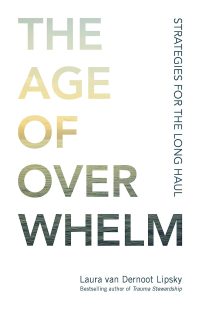Few, I think, would argue against the idea that we’re in the age of overwhelm. The amount of information that we encounter daily is overwhelming. The rate of change is overwhelming. That’s what makes The Age of Overwhelm: Strategies for the Long Haul such a great title. It’s the statement that we all know is truth.
Why It Matters
Before we delve into what being overwhelmed is or what to do about it, it’s important to understand why it’s important. It’s important because it drives some of the most negative effects that society grapples with. Substance use disorder (SUD) – “the drug problem” – is a result of the pain that people feel. (See The Globalization of Addiction and Dreamland for more.) Our American prisons and jails are overflowing as a result of lawless behavior that often comes from an inability to cope. Some, like Clay Johnson in The Information Diet, are calling for a more conscious approach to media consumption, but this is likely insufficient to confront the torrent of information we encounter every day. Daniel Levitin in The Organized Mind takes on the challenge of information overload – and how this leads to being overwhelmed – before explaining the cognitive processing impacts.
In short, humans don’t function well when we encounter too much information. Our productivity and our mental health suffer as we try to stand in the face of our daily experiences.

In Our Control
As we look to navigate in this world, we must recognize our self-autonomy and our ability to control only ourselves. We can’t stop the emerging use of AI-generated content and the impact that has on making our identification of key information harder. We can’t control the market forces that have driven an explosion of human-generated content in the last decade leading to an increasingly difficult position of identifying content of value. (So much for Peter Morville’s world of Ambient Findability.)
Depression
Sherry Turkle in Alone Together warns us that our technological connections aren’t the same as real connections. Robert Putnam in Bowling Alone and Our Kids warns us of how we’re becoming more alone and less civic than we’ve ever been. Chuck Underwood notes this in America’s Generations, as does Tom Brokaw in the introduction to The Greatest Generation. Simultaneous with the erosion of our personal, face-to-face connections, we’ve seen an explosion of depression to the point where it’s the number one mental health concern and takes a substantial bite out of our healthcare costs each year. (See Choice Theory and Warning: Psychiatry Can Be Hazardous to Your Mental Health for more about depression and treatment.)
Brokenness
Brené Brown is famous for her work on vulnerability – though she mostly describes herself as a shame researcher. (See Daring Greatly, Rising Strong part 1 and part 2, The Gifts of Imperfection, and I Thought It Was Just Me (But It Isn’t) for Brown’s work.) Central to her work is the understanding and acceptance that we’re all broken. We’re all vulnerable. We all need others to accept us for who we are – not who we want to appear to be. (See How to Be an Adult in Relationships for more about acceptance.)
Another recurring theme in Brown’s work is the sense that we’re “enough.” It’s not clear what context we’re evaluating ourselves on, who sets the standard for “enough,” or even that there is such as thing as enough. Yet each of us faces these questions – particularly in the face of overwhelming situations every day.
Humility and Learning
If we want to survive this overwhelming world, we must be humble. The best definition of humility, I believe, comes from Humilitas: “power held in service to others.” There’s a lot to our pull towards compassion and why it is critical for our survival as humans even if some try to do “social loafing.” (See SuperCooperators and Does Altruism Exist? for more on how our compassion and altruism have evolved. See The Righteous Mind and Collaboration for more on “social loafing.”)
In the end, the best that we can do is find ways to learn and keep learning. We won’t keep up with the overwhelming pace of change, but we can perhaps make it easier to live in The Age of Overwhelm.


No comment yet, add your voice below!